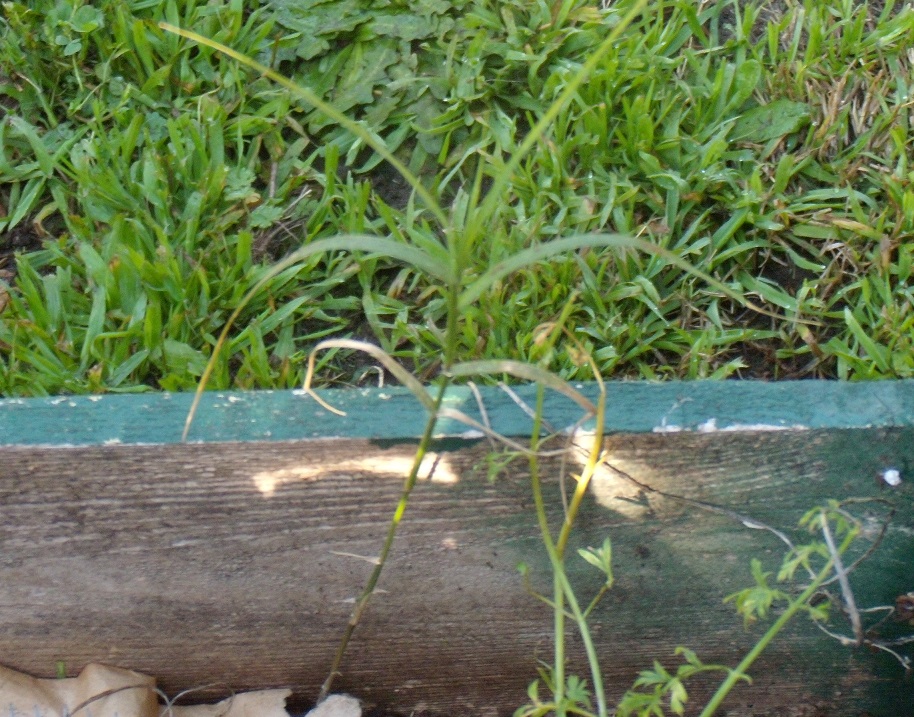by Margie Siegal
Bermuda grass, whose Latin name is Cynodon dactylon, is native to Europe, Africa, Australia and much of Asia and is found both world wide and all over my yard. The blades are a grey-green color and one to six inches long. The grass blades grow on erect stems, which can get a foot high. Seed heads are produced in spikes at the top of the stem. Bermuda grass has a deep root system and can grow over six feet deep in good soil, although most of the roots are less than two feet under the surface. Above ground, Bermuda grass sends out feelers that creep along and root wherever a node touches the ground, forming a dense mat.

It is not poisonous to other plants, grazing animals or humans and is a good source of fodder for cows, goats and sheep in many different climates. Bermuda grass is used in Ayurvedic medicine and as an offering to Ganesha, my favorite Hindu deity, the one with the elephant head.
Bermuda grass also generates strong opinions. After living with the stuff for several years, here are mine:
Why I Love Bermuda Grass
- It is immortal. It is the organic version of AstroTurf.
- I have a Bermuda grass lawn in front and Bermuda grass paths between my vegetable beds. I never water it. I never fertilize it. It never needs reseeding. I just mow it occasionally.
- Bermuda grass stays green during the summer if it is near trees. The trees draw up groundwater and respire through their leaves. The resulting morning dew is enough to keep the Bermuda grass growing.
- If Bermuda grass is not near trees, it goes dormant in summer, then springs to life as soon as a little water hits the ground.
- Bermuda grass will put up with foot traffic and even with occasionally running a motorcycle over it.
Why I Hate Bermuda Grass
- It is more invasive than Attila The Hun. Bermuda grass can grow up through eighteen inches of raised bed. It quickly spreads both through roots and above ground stems, and heads straight for your flower beds and vegetable patches, where it will out-compete anything you are trying to grow.
- Bermuda grass control is very, very difficult.
The problem is that Bermuda grass doesn’t want to stay where you want it to stay. It wants to travel and see things, and keeping the stuff in line is not easy. Many minds have applied themselves to the problem. If you look on line, you will find suggestions to control Bermuda grass that don’t work. Many of these suggestions are from the perspective of a commercial landscaper who doesn’t want to spend all day fighting Bermuda grass. They are mostly wishful thinking
For example, if you Rototill Bermuda grass (I have tried, it clogs the tiller every ten minutes), the chopped up pieces regrow into new plants. Enough herbicide to kill Bermuda grass will also kill everything else you are trying to grow, and maybe you. The most common herbicide, glyphophosphate (aka Agent Orange) has been found by the World Health Organization’s (WHO) International Agency for Research on Cancer to be “probably carcinogenic to humans.”
I have seen suggestions to cut off the top layer (leaving roots which will regrow in a week) and suggestions to dig down six inches (roots are found two feet deep and sometimes more than that)
Salt and vinegar solution is organic and nontoxic to people and critters, but, if applied in large enough quantity to kill Bermuda grass, will also kill all the other plants you are trying to grow.
Tarping over Bermuda grass with plastic will work if you are very careful to follow the instructions. I have seen Bermuda grass growing through the plastic in a spot where a tiny bit of sun and water got through. Of course, if there is any Bermuda grass nearby, it will head for the spot you tarped off as soon as you remove the tarp.
I just dig it out and pull out any I see coming up through my vegetable beds. My favorite tools for dealing with unruly Bermuda grass are a claw weeder (for pulling out the roots) and a hori-hori knife. A hori-hori knife is a thick, wide knife with a sturdy wooden handle. It has a saw blade on one side, which makes quick work of cutting through roots. Pulling Bermuda grass roots aerates the soil in addition to dealing with a pesky upstart.
Yes, digging weeds is a lot of work. Attitude is everything – just think of a morning spent digging out the Bermuda grass as exercise. Exercise is good for you, right? Gym memberships are costly, and you can dig out the Bermuda grass for free! Bring out the boom box, wear weird exercise clothes and dig away. Put the pieces of Bermuda grass and roots you dig out into the green bin. It is unlikely that your own compost heap gets hot enough to kill the stuff, so let the City deal with it.
